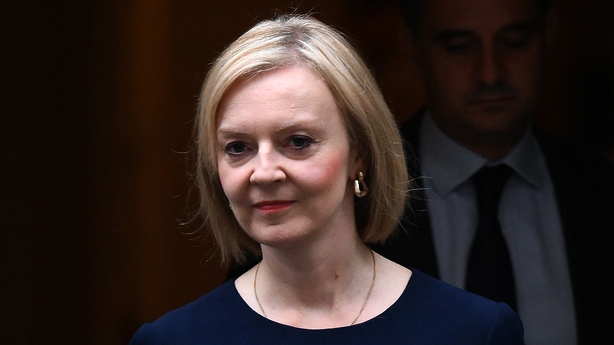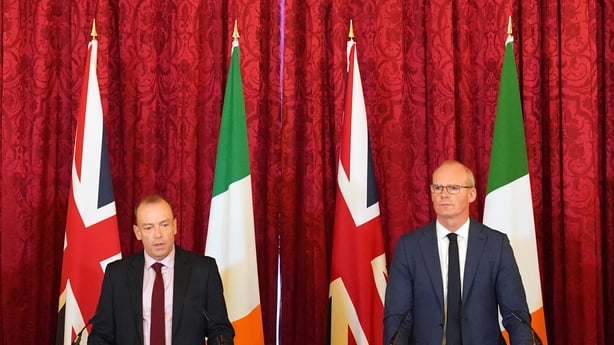Jeffrey Donaldson has been keeping his powder dry this week.
As relations between the Irish and British governments appear to be improving with talk of dramatically changed mood music and increasing optimism about finding a solution to the Northern Ireland Protocol dispute, he has kept his counsel.
That silence will be broken just after noon today.
An audience of around 500 will be in a function room of a hotel in south Belfast as the Lagan Valley MP delivers his first speech to a DUP conference as party leader.
But the audience he will address is much larger, with every word being scrutinised by government ministers and senior officials in Dublin, London and Brussels.
The focus will be on what he says about one issue: the Northern Ireland Protocol.
This conference comes at a time of great nervousness and uncertainty within unionism and loyalism in Northern Ireland.

When, as British Foreign Secretary, Liz Truss infuriated the Irish Government and the EU by unilaterally introducing legislation that could override the protocol, the DUP and its supporters rejoiced. As far as they were concerned, this was the UK finally listening to its concerns and standing up to Europe.
That confidence grew when as prime minister she appointed hardline Brexiteer and former chair of the anti-Protocol European Research Group of Conservative MPs Chris Heaton-Harris as Northern Secretary, and his fellow former ERG chair Steve Baker as minister of state at the Northern Ireland Office.
"We know where they stand," said one senior DUP source shortly after the appointments were announced.
The problem for the party now is that it now has some doubts about where they stand. There have been widely reported claims that Liz Truss, Chris Heaton-Harris and Steve Baker may be preparing to change their position and to soften the British government's approach to the protocol: that negotiation will trump confrontation.
That's the approach the Irish Government, the EU and the White House administration have been advocating for many months.
Mr Baker had unionist and loyalist eyebrows reaching new heights last Sunday, when during the Conservative Party conference in Birmingham, he apologised to the Irish Government and the EU for his "ferocious" attitude during the Brexit process.
Taoiseach Micheál Martin welcomed the apology and expressed desire to improve relations with the Irish Government, describing it as "honest" and "very helpful".
While the NIO minister also spoke of the UK's "resolve" on the issue and said it is not acceptable for Northern Ireland to be "so separate" from Britain, there was anger and concern about his apology, and subsequent remarks on RTÉ's Morning Ireland about the need to "de-escalate" tensions on the issue.
Ian Paisley, the DUP's MP for North Antrim, denounced Mr Baker as "naive".

Those comments came days after Chris Heaton-Harris and Minister for Foreign Affairs Simon Coveney had held their first face-to-face meeting since the new Northern Secretary was appointed.
The media noted that the body language between the two men appeared much warmer than between Mr Coveney and Brandon Lewis when he was Northern Secretary, and the talk was of optimism that a negotiated resolution of the protocol dispute could be found.
From the moment of his appointment, Mr Heaton-Harris has repeatedly said he cannot see any reason why the DUP should not be back in power-sharing and has warned that he won't hesitate to trigger a fresh Assembly election if the Stormont Executive is not back up and running by 28 October.
Liz Truss herself repeated that message on Monday in an interview with UTV's Political Editor Tracey Magee.
The DUP response has been to hit back and harden its position.
Speaking on Morning Ireland on Tuesday, its former leader and current Agriculture Minister at Stormont, Edwin Poots, repeated its view that the protocol and power-sharing are incompatible.
He also again warned that the future of the Good Friday Agreement, which the DUP opposed every step of the way during the negotiations that produced it, could be in jeopardy if the dispute is not resolved to the party's satisfaction.
Mr Poots said that unless something radical happens, if US President Joe Biden was to visit Belfast next Easter to mark the 25th anniversary of the Agreement "then he'll be coming over to the funeral of the Good Friday Agreement, not to a celebration".
The Irish Government is being cautious, well aware that what is said by UK officials during negotiations with the EU in the weeks and months ahead may be different to those in public.
Let's see words matched by actions is the approach.
But Minister Coveney has spoken of a dramatic change in the mood and "a new era of positivity".
During the British Irish Intergovernmental Conference meeting in London yesterday, Steve Baker posted a photo on Twitter of him with the smiling Irish contingent of Simon Coveney and Minister for Justice Helen McEntee, along with the Northern Secretary.
— Steve Baker MP FRSA 🗽 (@SteveBakerHW) October 7, 2022
It was a photo that would have been unthinkable during Brandon Lewis's time as Northern Secretary when Irish-British relations plummeted.
There is a palpable sense of nervousness within unionism and loyalism about this increasing "jointery", the apparent warming of relations between London and Dublin and what that might mean for the UK's negotiations with the EU on the protocol.
Pressure is growing on the DUP to shift its position and to agree to go back into power-sharing while those negotiations continue.
Jeffrey Donaldson is expected to make it very clear that those applying such pressure are wasting their time and energy.
'The priority is to prevent Northern Ireland's position within the Union being diluted'
Unlike the British government, with its short-lived scrapping of the higher 45% tax rate, the DUP is not for turning.
It says there are still huge practical problems being caused by the protocol, from a 25% tariff on steel coming into Northern Ireland, to shortages of veterinary medicines and mountains of paper work for many small businesses.
But for the party, this is about much more than reducing checks on goods and products coming from Britain to Northern Ireland.
As far as it is concerned, the existence of any legal barrier between Northern Ireland and Britain, even if all checks were to be abolished, is a constitutional threat and a weakening of the Union.
"From our point of view, it would be much more damaging and destabilising to have the Stormont institutions back up and running while at the same time Northern Ireland's constitutional position within the UK is being weakened," explains a senior source.
"The priority is to prevent Northern Ireland's position within the Union being diluted or undermined, that is much more important to us than a functioning Executive at Stormont.
"If there is any sort of border in the Irish Sea between Northern Ireland and Great Britain that means we are treated differently to England, Scotland and Wales, that means we are not an equal part of the United Kingdom and that is just not acceptable."
The theme of the DUP conference is "Moving Forward Together".
That's likely to bring wry smiles to the faces of its many critics who will point out that it is the DUP that has refused to go back into power together with Sinn Féin, the Alliance, Ulster Unionists and SDLP.
The bottom line is that for the DUP, moving forward together just doesn't mean those who live in Northern Ireland, it also means together with the rest of the United Kingdom.
The mood music from the party conference is expected to be loud and clear.







